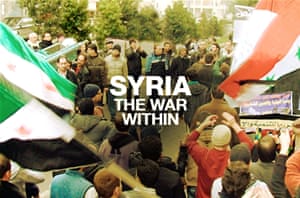UN official calls Syria conflict ‘civil war’
![]()
UN peacekeeping chief says government has lost “large chunks of territory” as witnesses describe heavy shelling in Homs
The head of the United Nations’ peacekeeping operations has said that the situation in Syria now amounts to a full-scale civil war as witnesses on the ground described fresh shelling on Homs and heavy fighting in other cities.
“Yes, I think we can say that,” Herve Ladsous, the head of the UN’s Department of Peacekeeping Operations, said in New York on Tuesday, when asked whether he believed Syria was now in a state of civil war.
“Clearly what is happening is that the government of Syria lost some large chunks of territory, several cities to the opposition, and wants to retake control.”
Kieran Dwyer, a spokesman for the UN peacekeeping department, told Al Jazeera that Landous’ description was “related to what is going on in the last five days.”
“What we’ve seen in the last five days is a huge upscaling of the military confrontation,” he said. “[It’s by] both sides, at a huge cost to the civilian population.”
Earlier, angry crowds hurling stones stopped UN observers on Tuesday from reaching al-Haffa, the besieged coastal town where a violent crackdown is feared.
UN observers were also in Homs, in central Syria, where heavy shelling continued. Observers filmed helicopters over an area where smoke was seen.
The UN says its monitors saw fire coming from the helicopters although it was unable to distinguish whether machine guns were being used.
Trapped in homes
Activists reported heavy shelling in several districts in Homs. Residents of al-Khalidiyeh neighbourhood told Al Jazeera that they had been trapped in their homes for the last three days without electricity or water.
Other neighbourhoods were reportedly targeted as well, and videos from the city, long a rebel stronghold, showed explosions in built-up areas.
Abo al-Barra, a doctor in Homs, told Al Jazeera that there were wounded civilians in need of evacuation. “They are severely injured,” he said.
“The women are badly injured, there are serious injuries.”
The Associated Press news agency, meanwhile, reported heavy fighting in the eastern city of Deir al-Zor, where activists said at least 10 people were killed by artillery fire from the Syrian army.
The UN mission in Syria posted this video, shot in and around Homs, which shows the aftermath of some shelling [UNSMIS]
Amateur video of the attack showed dead people in a street as survivors screamed in panic and tried to remove their bodies.
The violence comes as President Bashar al-Assad’s government faces mounting international pressure over its tactics against the opposition.
The US expressed worries on Tuesday that Russia may be sending Syria attack helicopters and rejected Russian claims that its arms transfers to Syria were unrelated to the conflict.
Addressing a forum in Washington, Hillary Clinton, the US secretary of state, said: “We have confronted the Russians about stopping their continued arms shipments to Syria. They have, from time to time, said that we shouldn’t worry – everything they are shipping is unrelated to their [the Syrian government’s] actions internally.
“That’s patently untrue.”
The UN released a report on Monday citing witnesses describing the use of children as human shields. It also said children had been victims of detention, torture and sexual violence.
“The [UN] secretary-general expresses his deep concern at the dangerous intensification of armed violence across Syria over the past several days, and the grave danger facing civilians in areas under fire,” Ban Ki-moon’s office said in a statement.
“The bloodshed and fighting must stop at once.”
Ban’s criticism is based partly on reporting from the UN observer team on the ground in Syria, which also reported “planned and co-ordinated attacks [by rebels] on government forces and civilian infrastructure in multiple locations”.
‘Angry crowds’ in al-Haffa
The UN has about 300 observers on the ground charged with monitoring both sides’ compliance with a peace plan mediated by Kofi Annan, the former secretary-general turned UN envoy.
But the observers have been unable to reach certain parts of the country, including al-Haffa.
The mission said it was barred from entering al-Haffa by “angry crowds” who threw rocks and metal rods at their vehicles.
“The security situation is not safe for them to enter,” Sausan Ghosheh, a spokeswoman for the observer mission, said.
“They were at the last checkpoint and the government said, ‘you can go through,’ but we deemed it unsafe.”
Fighters in the town said on Tuesday that hundreds of rebels were fighting a tank- and helicopter-backed assault on their district, which is tucked among rugged mountains.
Clashes started a week ago between rebels and security forces who were setting up checkpoints to tighten their grip on the strategic town, which lies close to the port city of Latakia as well as the Turkish border.
It has allegedly been used by rebels to smuggle people and supplies.
Most accounts of violence cannot be independently verified, as Syria restricts access for journalists.
Related Articles
Revolucionarios sin revolución
![]()
Imaginarios políticos en Arabia Saudí Rosie Bshir Jadaliyya Traducción para Rebelión de Loles Oliván. La contrarrevolución que dirige actualmente Arabia
Reinventing Progressive Politics in Canada
![]()
The Last Field of Battle? We are so accustomed to the connection between political parties and democracy that to question
Malí, ¿el siguiente Afganistán?
![]()
Immanuel Wallerstein La Jornada Esta hace muy poco tiempo eran muy raras las personas que hubieran siquiera escuchado hablar de



